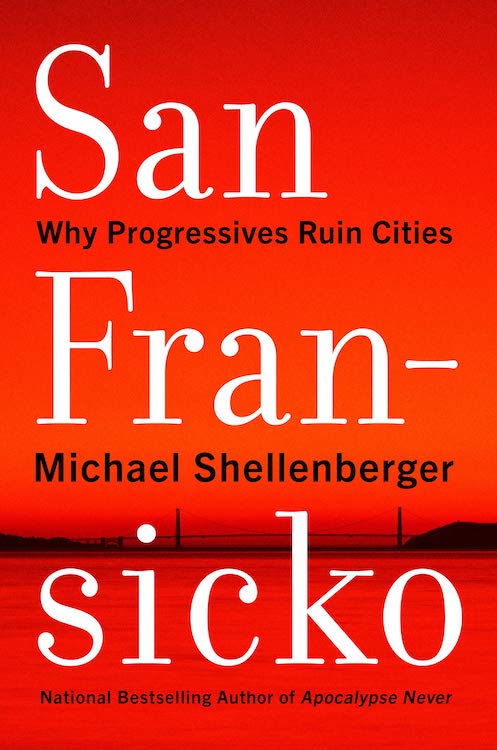I love the city of San Francisco. Been there many times. It really is beautiful, and I don’t think it’s as bad as a lot of people are making it out to be. But there are undoubtedly problems. And big ones too.
Big enough that even those running the place are taking notice, demonstrated most recently by the mayor’s declaration of a state of emergency in the Tenderloin District. Interestingly, her action comes not long after the 2021 publication of the Michael Shellenberger book, San Fransicko: Why Progressives Ruin Cities. Now, before you go on accusing Mr. Shellenberger of being a right-wing Fox News analyst, you should know that he’s actually quite left of center. It’s just that he’s also a realist. He can look at the bare-faced facts – the blatant empirical evidence showing that San Francisco, arguably the nation’s most progressive city, is getting far worse in some of the things that progressives champion, like solving the problems of homelessness and addiction.

But they’re going the wrong way – and precipitously so. It turns out there’s a conflict between letting people do whatever they want, and actually being safe, clean, and welcoming to all. San Francisco has become so bad that entire websites are dedicated to mapping human feces on the city’s streets.
I picked up the book a week ago or so and I’m almost done with it now; and I have to admit, I’ve seen hints of what I think is the biggest problem in a few places, but I don’t think Shellenberger is going to really get to it – quite simply, a rejection of God. He does touch on the spiritual dynamic a bit, and uses the example of Jim Jones and the People’s Temple – headquartered in San Francisco prior to the events of 1978 when over 900 of its members, along with its founder, committed suicide (many actually murdered) — to get there.
The point I’m seeing at depth is the progressive tendency to believe almost exclusively in the triumph of man over his environment. They believe there’s not a problem we can’t solve on our own, but even more so, that those who actually believe in a (overwhelmingly in these cases, “Christian”) God are the solution’s biggest obstacle. As I’ve heard it said – it’s not that those who don’t believe in God don’t believe in something, it’s that they’ll believe in just about anything but God. This is where the parallels drawn from San Francisco’s relationship with the People’s Temple struck me. The brand of “Christianity” pushed by Jones in those San Francisco days was all about loving, open-armed work. But of course, we know how that turned out.
Shellenberger also mentions elsewhere in the book the tendency for progressives to turn away from any form of assistance that can be considered “faith-based.” Again. They have “faith,” but it’s in humanity. To suggest that one’s help comes from a higher power – a power to which one is accountable – is anathema to them, so much so that they’d rather die rejecting the help of a Christian than admit that the Christian might actually have a solution that can help. The first chapter of Paul’s letter to the Romans certainly comes to mind here: “21 For although they knew God, they did not honor him as God or give thanks to him, but they became futile in their thinking, and their foolish hearts were darkened. 22 Claiming to be wise, they became fools, 23 and exchanged the glory of the immortal God for images resembling mortal man and birds and animals and creeping things.”
Like I said, this is the foundation of all of this – the complete rejection of God. In some, it’s quite subtle. You might even mistake them for a “Christian.” I mean, they do “Christiany” things, right? They give to the poor. They feed the hungry. All good stuff. But the motivation is all wrong. Look beyond the surface and you see either someone trying to earn their keep or someone trying to draw attention to themselves as savior. They do “good,” and yet they’ve rejected God too.
But there are some cases where the rejection is far more nefarious, and this is what I’m seeing in this book — a rejection so complete that they would rather attack and close Christian organizations who’ve done incredible works in communities than accept their help.
Face it. There are bullies out there. They’re all over the place and on all sides. But what solution is there? Maybe I sound like a broken record. Maybe I sound like I’m saying “it’s as easy as that.” If it was, then everyone would see it my way. It isn’t. But interestingly, as I was looking up the verses from Romans, biblegateway.com came to my aid again with their verse of the day:
If anyone says, “I love God,” and hates his brother, he is a liar; for he who does not love his brother whom he has seen cannot love God whom he has not seen. And this commandment we have from him: whoever loves God must also love his brother.
1 John 4:20-21
This is such a large part of the foundation to which the Christian is called in this world. And it’s a good place to start. Against such a thing there is no law…
